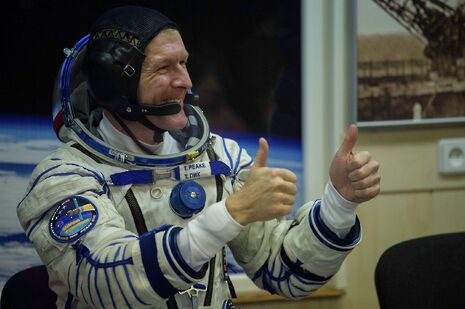Cambridge PhD student could be Mars-bound
Ryan MacDonald is amongst the final 100 candidates in the selection process

Ryan MacDonald, a 22-year-old theoretical astrophysicist at Gonville and Caius College pursuing a PhD in Astronomy, could potentially be going on a one-way trip to Mars.
Over 200,000 hopefuls around the globe applied for the coveted 24 spots as Mars One crew, and MacDonald is amongst the final 100 candidates in the selection process.
This September, he will go through a two-week assessment that will determine whether he will be one of the astronauts settling on the first colony established beyond planet Earth. While the prospect of a one-way trip to another planet might seem intimidating, it does not faze MacDonald.
“I’ve been fascinated by space for as long as I can remember,” he said. “But as a young aspiring astronaut in the ‘90s, there were few positive role models to look towards, since the UK’s official policy discounted human spaceflight.”
The Mars One programme aims to take the ‘next giant leap for humankind’, proposing to establish permanent human settlement on the red planet, with the first crew to depart in 2026. The project is spearheaded by an elite team of eight, including a Nobel Laureate, an astronaut and a former NASA Chief Technologist.
It was not until he had the chance to speak with Major Tim Peake – the first Briton to walk in space – at the launch of the UK Space Agency in 2010, that his childhood dreams of spaceflight suddenly seemed realisable.
After that encounter, MacDonald had his sights set on the European Space Agency, anticipating the moment when they open applications again in the 2020s.
The typical minimum requirements for astronauts are a science PhD and/or three years of relevant research experience or, alternatively, a BA in Science and 1,000 hours as a jet pilot.
Three years after meeting Major Peake, in April 2013, Mars One opened its applications. An unexpected opportunity for MacDonald to realise his interstellar dreams had presented itself and he grasped it with both hands.
“Sure, I thought, the chance of being accepted would be small, but how could anyone turn down the chance to be one of the first scientists on Mars?”
Getting this far in the selection process was no easy feat – the interview round was particularly daunting as it tested the candidates’ ability to apply large quantities of newly learnt information in unfamiliar contexts.
“We were provided with a cart-load of information concerning past missions to Mars, the Martian environment, technical aspects of the life support systems and the colonisation plan, amongst many other topics.”
MacDonald’s interview was conducted by Dr Norbert Kraft M.D., a NASA award winning expert in Aerospace Medicine, which MacDonald admits was ‘terrifyingly tense’, but also an ‘incredible opportunity’ as it was a chance to speak to a distinguished figure in the field of human spaceflight.
Even though he knows he might not end up being one of the scientists on Mars, the passionate astrophysicist has relished the chance of meeting other candidates on the project. He has met 26 of the current 100 candidates in person, and feels honoured to be counted amongst them.
“I’ve met candidates with backgrounds in aerospace engineering, medicine, law, sustainability, physics, astronomy… They are an incredible bunch of people that represent a diverse cross-section of society.
“Oh, and Neil deGrasse Tyson and NASA Astronaut Mike Massimino also Skyped me on TV, so there’s that!”, MacDonald revealed.
Aside from being an academic, he also runs outreach activities for younger audiences and is currently finishing a near-future hard science fiction novel. Through being part of the Mars One project, he has been offered various opportunities to inspire others through public speaking, and he agrees that the experience of doing so has enriched him as a person.
“For me the absolute highlight has been the fantastic educational platform my status as a candidate has afforded me, to speak to schools around the world about space, planetary science, human missions to Mars and careers in STEM.”
He has also spoken at international conferences, a TEDx event, and was even recently accepted into a professional speaking organisation.
MacDonald admits that what fuels his passion is the legacy the project will bequeath, noting that he was “fascinated by the scientific potential but it’s the inspirational potential that really drives [him]”.
When asked to offer advice to aspiring youngsters, he said: “Identify what is that one thing in life that you are passionate about more than any other, then pursue it relentlessly. The only limits in life are self-imposed, so chart your course, chip away at the obstacles, and you will get there in the end”.
 Interviews / You don’t need to peak at Cambridge, says Robin Harding31 December 2025
Interviews / You don’t need to peak at Cambridge, says Robin Harding31 December 2025 News / Unions protest handling of redundancies at Epidemiology Unit30 December 2025
News / Unions protest handling of redundancies at Epidemiology Unit30 December 2025 Comment / What happened to men at Cambridge?31 December 2025
Comment / What happened to men at Cambridge?31 December 2025 Features / ‘Treated like we’re incompetent’: ents officers on college micromanagement30 December 2025
Features / ‘Treated like we’re incompetent’: ents officers on college micromanagement30 December 2025 Theatre / We should be filming ADC productions31 December 2025
Theatre / We should be filming ADC productions31 December 2025







